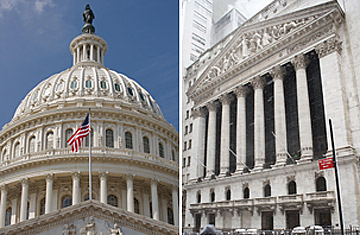
It's funny how fast the Beltway consensus can change. A few months ago, health care reform was dead. Then it got undead. Financial regulatory reform was supposedly dead too, but now that Republicans have supposedly learned that pure obstructionism is a losing play, it's being treated as a done deal. Democrats like Obama's economic adviser Larry Summers and Senate Banking Committee chairman Christopher Dodd are saying it's going to pass, perhaps as early as next month. So are key Republicans like Senator Judd Gregg of New Hampshire, who recently put the odds of passage at "100%."
Let's just say that seems high.
It is conceivable that a new wave of bipartisan cooperation will sweep financial reform into law — even though the House version passed last year with zero Republican votes; even though Dodd's version passed through committee last month with, yes, zero Republican votes; even though Big Finance is blasting boatloads of money around Washington to block reform. It's at least plausible, as I've written, that if President Obama succeeds at framing reform as a stark banks-vs.-people choice, and enough Republicans get nervous about the political price they might pay for siding with Wall Street, a deal could be cut to get the issue out of the news before November. And the most recent behavior of Republicans — their hopeful rhetoric about reform, their sudden openness to concessions on the consumer financial-protection agency they've been bashing for months — is consistent with a desire to cave rather than fight.
Yet their behavior is also consistent with a desire to appear reasonable, maintain the illusion of good-faith negotiations and insulate themselves from charges of carrying the industry's water when the negotiations fall apart. We saw this movie during health care. And if you focus on the fundamentals — political and substantive — instead of the latest Washington kabuki, the path to passage is a lot harder to envision than the path to oh-well-maybe-next-year.
Start with the calendar. Financial reform still needs to get through the full Senate. Then the House and Senate would have to work out a compromise bill, which would have to get through the House and Senate again, which would mean ample opportunities for filibusters and other delays. And the window for bipartisan cooperation — never a particularly large window — gets smaller every day. "Time is not the friend of reform," an Administration official told me in January. "This won't get done after everyone goes home to campaign in August."
Of course, a deal could happen before August if everyone really wanted one. But that is not the case.
Obama clearly wants reform; he's been outspoken about the need for a dramatic regulatory overhaul to prevent another financial meltdown. But he's been so outspoken — especially about the consumer agency — that it would be tough for him to accept anything less dramatic than his tough proposals. And many Democrats see an uncompromising stance against Wall Street as a political winner; if it doesn't produce a bill, they're happy to have an issue they can use against Republicans in the fall.
